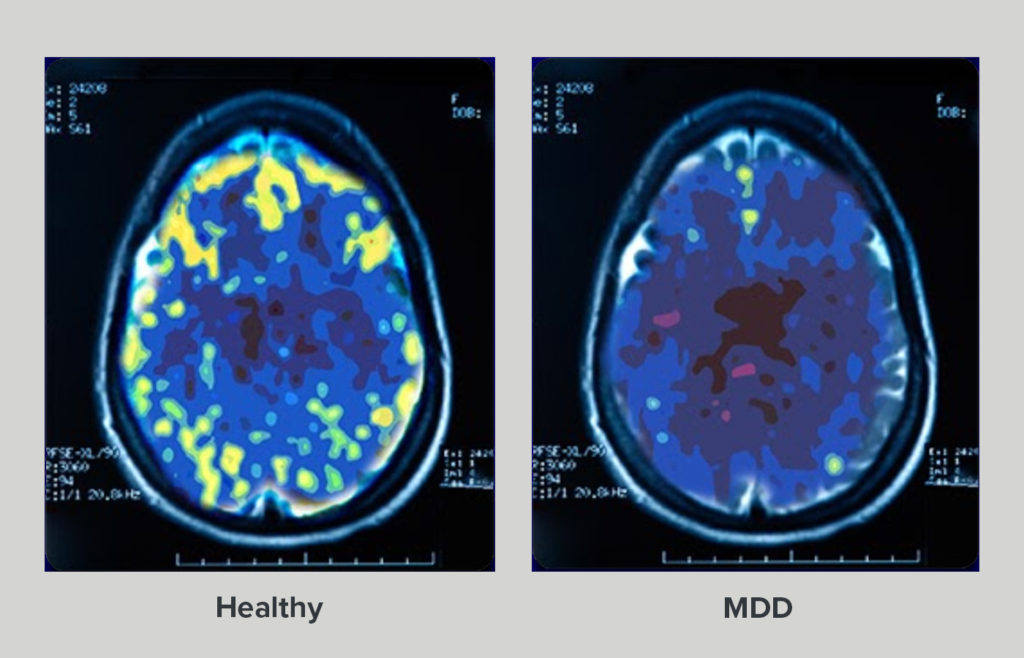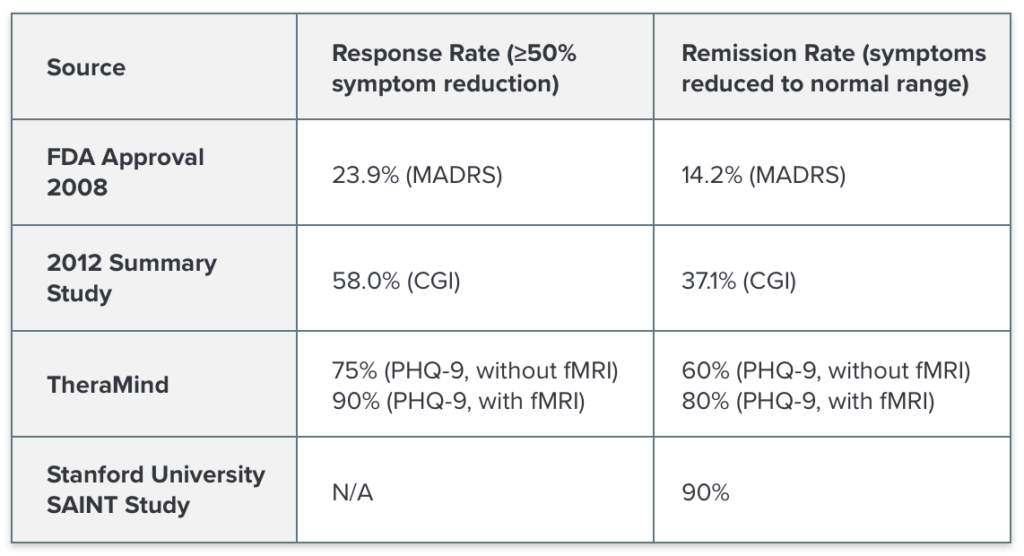Depression
Depression that is not adequately controlled through antidepressant drug therapy is treated safely and very effectively at the TheraMind Center of Santa Monica using transcranial magnetic stimulation (TMS).
What is Depression?
Depression is a serious, often debilitating, medical condition affecting more than 17.3 million American adults every year. [1] It can affect every facet of a person’s daily life, from how they sleep and eat to their interactions with other people and may last for months and even years. Research suggests that depression is currently the second leading cause of disability worldwide. [2] In 2000, the economic burden of depression was estimated at $83.1 billion in the U.S. alone. [3] Each year in the US, over 30,000 people die by suicide, 60% of whom suffer from depression. [4] Overall, women are almost twice as likely as men to suffer from depression; however, depression in men may be under-reported. [5] Depression can affect anyone; it has no racial, ethnic or socioeconomic boundaries. About two-thirds of those who experience an episode of depression will have at least one additional episode in their lives.
The onset of a depressive episode may be triggered by an external factor such as trauma or shock or an internal factor such as stroke. Anger, frustration, fear, anxiety, sadness, hopelessness, often describe the mental states of depression sufferers. While the exact cause of depression is not known, the leading scientific theory is that depression is caused by decreased activity in the neural networks of the brain that regulate mood.
Historically most depressive symptoms have been treated with antidepressant drug therapy. However, more than 4 million (estimated) adults in the U.S. do not receive adequate benefit from antidepressants and/or cannot tolerate the side effects caused by them. Serious side effects including weight gain, insomnia, fatigue, sexual dysfunction, nausea and indigestion often occur causing patients to cease using these medications. For these patients, an alternative treatment modality such as Transcranial Magnetic Stimulation (TMS) can be life saving.
Brain activity is reduced in depression

A PET scan measures vital functions such as blood flow, oxygen use and blood sugar (glucose) metabolism. The PET scan graphic above demonstrates the difference in brain activity between a normal and depressed brain.
Our approach
Since 2015 the TheraMind Center of Santa Monica has been successfully treating patients suffering from Major Depressive Disorder (MDD) using non-invasive technologies such as transcranial magnetic stimulation (TMS). Patients interested in undergoing therapy at the Center are asked to provide a detailed medical history including all prior depressive episodes and current and former antidepressant regimens. Following collection of these records and certain diagnostic testing our staff schedules a consultation with one of our physicians who will first diagnose or confirm the diagnosis of MDD and determine whether the patient is an appropriate candidate for TMS or one of our other treatment modalities.
If the patient is considered qualified for TMS therapy the patient is given the option to have an advanced MRI (fMRI). The fMRI can then be used to (a) eliminate other potential causes of the symptoms, (b) further confirm the MDD diagnosis and (c) provide a road map for treatment locale(s). TMS treatment protocols are custom designed for each patient. In general, however, the therapy consists of an initial brain mapping to determine intensity and placement followed by 20 to 35 individual sessions.
Results
TheraMind Center response (> 50% improvement in pre-existing symptoms) and remission (symptom reduction to normal range) rates vary depending upon whether our physicians are provided with advanced fMRI brain imaging to inform our TMS targeting. Without such imaging, our response rates are roughly 75% and remission rates approximately 60%. With such imaging, response rates near 90+% are achieved and remission rates are roughly 80%. The table to the right compares these results to the response and remission rates upon which the FDA relied in 2008 when originally approving TMS for clinical use [6] and those reported in a 2012 study of outcomes in actual clinical practice [7]. Researchers at Stanford University recently reported remission rates at 90% using advanced brain imaging coupled with a multi-session daily TMS treatment protocol.[8] As can be seen from the table, TheraMind response and remission rates exceed both the 2008 FDA and 2012 actual clinical practice rates of response and remission. It should be noted that the Stanford study cited was a small study with additional clinical trials planned to confirm results.

References
- “Major Depression.” NIMH.nih.gov, National Institute of Mental Health. https://www.nimh.nih.gov/health/statistics/major-depression.shtml. Last updated February 2019.
- Greenberg, PE, et al. The economic burden of depressive disorders in the United States: How did it change between 1990 and 2000? Journal of Clinical Psychiatry. 2003; 64 (12): 1465-1475.
- Murray CJ, Lopez AD. Evidence-based health policy – lessons from the Global Burden of Disease Study. Science. 1996; 274 (5288): 740-743.
- Heron, Melonie, et al. Deaths: Final Data for 2006. National Vital Statistics Reports, 57 (14). April 17, 2009.
- Kessler, RC, et al. The epidemiology of major depressive disorder; results from the National Comorbidity Survey Replication (NCS-R). JAMA. 2003; 289(23): 3095-3105.
- O’Reardon, John P.,et al, “Efficacy and Safety of Transcranial Magnetic Stimulation in the Acute Treatment of Major Depression: A Multisite Randomized Controlled Trial,” Biol Psychiatry 2007; 62-1208-1216.
- Carpenter, Linda L., et al., “Transcranial Magnetic Stimulation (TMS) for Major Depression: A Multisite, Naturalistic, Observational Study of Acute Treatment Outcomes in Clinical Practice”, PubMed 2012 July; 29(7): 587-96.
- Cole, E.J., et al. (2020 Apr 7). Stanford Accelerated Intelligent Neuromodulation Therapy for Treatment-Resistant Depression. Am J Psychiatry. appi.ajp 2019: 19070720.
